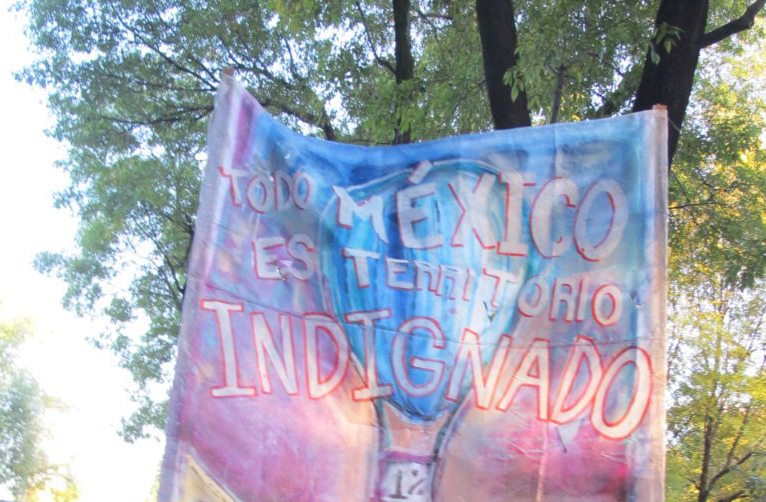Like vegetation on a burned grassland, Mexico is seeing a growth in community resistance movements in defense of local territories, of life and of Mother Earth. This growth is taking place under innovative formulas that include the rescue of culture and the intervention of art, communication, and the solidarity of urban sectors, including communities of scientists.
Para leer esta historia en Español haz click AQUÍ

Renovation of the World Ceremony – Wixarika pilgrims watch the sunset and prepare for the long night ahead. March 18th 2022. Photo: Tracy L. Barnett
A great ceremony for the renovation of the world took place on March 18th at Cerro Quemado in Wirikuta, San Luis Potosí, a sacred site of the Wixárika (Huichol). The event was organized by the Wixárika Regional Council, the Union of Ceremonial Centers, and the Committee for the Care and Defense of Water and Land of Real de Catorce (ejidos).
Their announcement reads:
“In this moment of uncertainty, fear, confusion, and discouragement, the Wixárika grandparents call to raise ‘mirror altars’ through art, music, dance, theater, talks, performances, temazcales, ceremonies, workshops.”
As of this writing, more than 400 mirror altars [“creative representations of the intention to renew the relationship of humanity with nature”] have already been organized on five continents!
The conservation of the Wirikuta territory and the band through which peyote has traveled for more than a thousand years from Jalisco, Nayarit and Durango, is an historic request (Wirikuta Defense of the Ancestral Territory of an Original People by Pablo Alarcón Chaires and Tunary and Cristian Chávez) that is being presented to the President of Mexico.*

View of Wirikuta sacred desert from Cerro del Quemado. Photo: Tracy L. Barnett
Another notable resistance is that of the Peoples’ Front in Defense of the Land of Atenco, State of Mexico, an organization that emerged in 2001 against the planned International Airport in Texcoco [cancelled in late 2018]. Today, based on an excellent study titled Hands to the Basin, the Peoples´ Front demand the proclamation of a Life Protection Area to preserve the still remaining wetlands of what was Lake Texcoco.

The project Hands to the Basin, is to create a Natural Protection Area in the Lake of Texcoco, State of Mexico.
In Mexico City, the Community of Milpa Alta is made up of nine pueblos, or towns, whose origins date back several centuries and whose territory — equal to 20 percent of Mexico City — encompasses forests, mountains, springs, and agricultural and livestock areas. Peoples Assemblies in the pueblos are creating brigades to defend the territory. Their action goes against the current of the high level of conflict that has prevailed, backed by the political parties, their deceitful leaders and the authorities.
In the state of Puebla, the Community Parliament for the Rights of Nature has been created. A consortium of 68 organizations, it brings together peasants, ejidatarios (collective landowners), teachers, workers, youth, women, consumers, dancers, musicians and people of knowledge inspired by the philosophy of buen vivir — good living — and dedicated to the rescue of the Atoyac River, the forests and water, the relationship between producers and consumers, rural tourism and the rescue of native languages. Its achievements include a network of 22 Community Radio Stations, a savings bank, a petition to form a Metropolitan Community Park in the north of the capital (which mobilized 10,000 residents) and alliances with social movements, governments and universities.
In Guerrero, an unusual event took place. The second Campesina Convention held in Zumpango del Río brought together 1,255 ejido and community commissioners, representing 80 percent of the state. This event reached political agreement on the supply of materials, agroecology, social and solidarity economy, governance, security, and defense of the territories. This event has inspired the rise of a new agrarianism, as similar meetings are announced in such states as Puebla, Veracruz and Morelos.

Montes azules reserve, Chiapas. Photo: agua.org.mx
Furthermore, in Chiapas, the 50 communities that live around the Montes Azules Reserve decided to promote the Lacandona Community as a biocultural region and develop a plan of life as a tool for community government. It is an exercise in self-government that overcomes decades of agrarian conflict and positions these peoples as co-participants in the conservation of the Lacandona forest.
Finally, in Yucatán, the battle waged by the Maya communities against the pig farms that contaminate aquifers and soils — and especially the ring of cenotes [natural pools formed when the roof of an underground cavern collapses, topped up by rainwater and underground rivers]. In addition to being a geohydrological reserve, these sites are considered sacred. The battle reached its greatest expression in the case of Homún; this Maya community managed not only to get the Supreme Court of Justice of the Nation to declare the suspension of the factory farm with 50,000 pigs affecting their health and that of their environment, but today they filed a law for self-government that sets an example for other communities.
All these achievements coincide with legal decisions won by the communities. These are the cases of the Maseual (Nahua) peoples of the Sierra Norte de Puebla who gained the suspension of mining projects in four municipalities, and the litigation won by the Coordinator of United Peoples for Water, a consortium of 16 communities from the Central Valleys of Oaxaca, in order to carry out the local management of aquifers.
*This document presents the position of the Technical-Environmental Working Group of the Wirikuta Defense Front Tamatsima Wahaa regarding the Technical Study justifying creation of the Wirikuta Biosphere Reserve and its Draft Decree.
This story was originally posted in Spanish in La Jornada and is shared here with permission of the author. Translation by Jane K. Brundage, founding editor of Voices for Mother Earth.

“All Mexico is outraged terrirory” – Banner from the Mobilization to Defend Wirikuta. Mexico City, October 2011. Photo: Tracy Barnett





